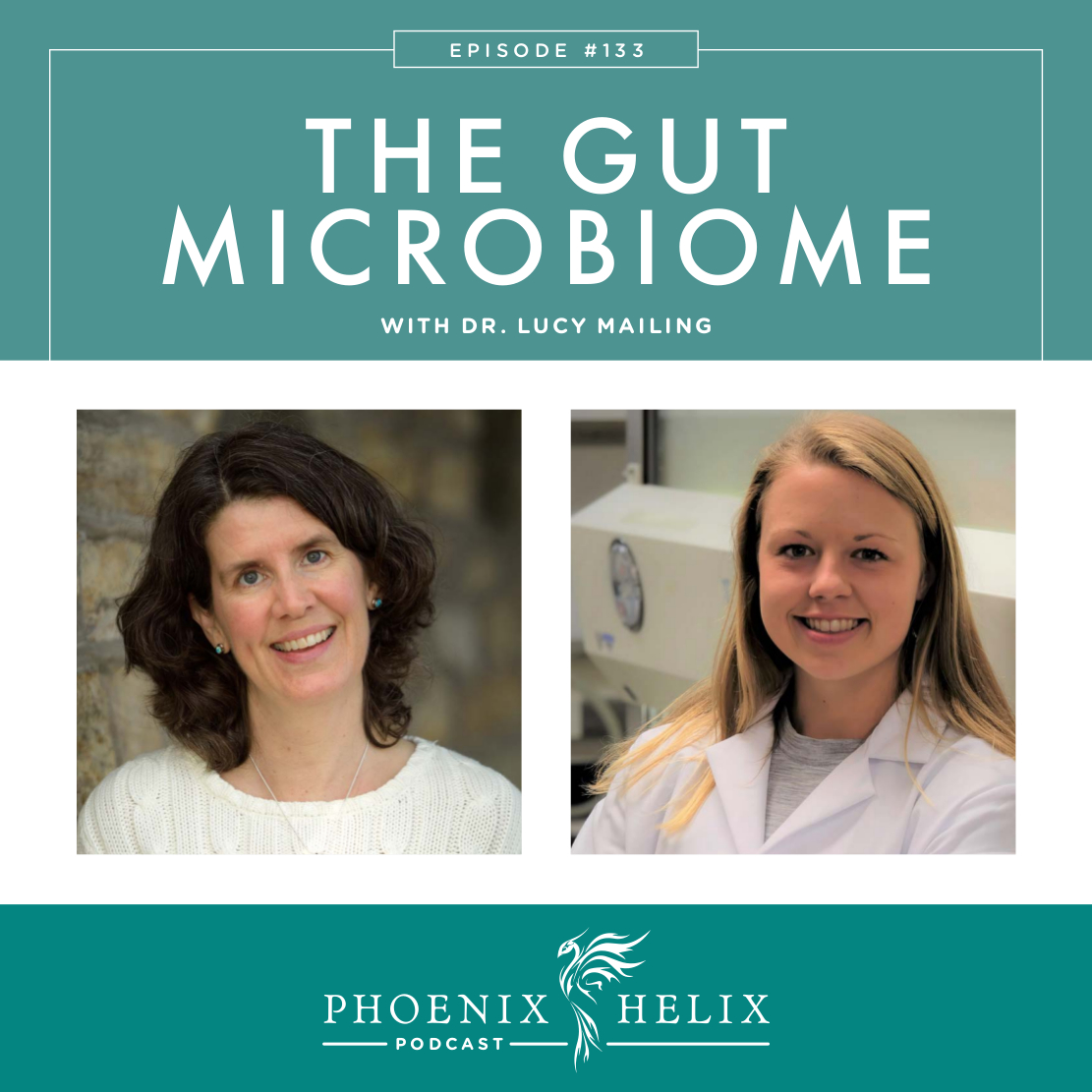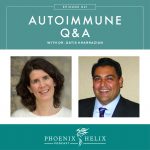Best of the Phoenix Helix Podcast
In support of my own autoimmune health, I’m taking a sabbatical for the month of December and releasing two of my favorite episodes from the archives that you might have missed. Today’s episode is one of the most popular of all time. There’s a community of 38 trillion microorganisms living in and on our bodies, and most of them reside in our gut. That’s very close to the number of cells in the human body. By this definition, we are only 50% human. This is why gut health has such a huge impact on human health, and research in this area is exploding. What does the science say about the intersection between the gut microbiome and autoimmune health? Where can we apply that knowledge in our own lives? And what are some common myths and misconceptions that new research is starting to dispel? My guest today is Dr. Lucy Mailing, a microbiome researcher and scholar of integrative gut health.
Listen to the Show
- Subscribe to my podcast through your favorite podcast app: iTunes, Stitcher, Google, TuneIn, Spotify, Amazon, etc.
- You can also listen to the episode right here through the player below, and if you subscribe to my newsletter you’ll get notified of future episodes.
Podcast: Play in new window | Download
Show Notes
- Intro (0:00)
- Thank You to Our Podcast Sponsor – Wahls Protocol Mobile Program on MasterHealth (2:27)
- Dr. Terry Wahls is one of the most popular guests on this podcast, and many of you have been inspired by her story. Through diet and lifestyle changes, she dramatically improved her MS symptoms, going from a wheelchair to a bicycle. She then created the Wahls Protocol to help other autoimmune warriors reclaim their health too.
- Here’s what Dr. Mark Hyman says: “For anyone suffering from autoimmune or other chronic health problems, The Wahls Protocol is life changing.”
- That said, new diet and lifestyle programs can be hard to start and hard to maintain. This is where this mobile program shines. MasterHealth’s expertise is in developing personalized coaching apps to help people make lasting habit changes, and this one is designed for the Wahls Protocol specifically. They use behavioral science principles to help you create new desirable habits and extinguish the undesirable ones. Doesn’t that sound great? And they also help you maintain those healthy habits through stressful times.
- In addition to the habit coaching, you also gain access to a supportive community of people focused on achieving the same goals as you.
- Get started today and use the code PHOENIX15 to save 15% off the annual program.
- Meet Dr. Mailing (4:13)
- Dr. Lucy Mailing is a research scientist specializing in how diet and lifestyle impact the gut microbiome in both health and disease states. She has authored several research articles in peer-reviewed journals and was was recently named an Emerging Leader in Nutritional Sciences by the American Society for Nutrition.
- Her career was inspired by her personal health challenges. She suffered with eczema for the first 20 years of her life, until she discovered the connection between diet, the gut microbiome, and skin health. After experiencing major improvements herself, she decided to make the microbiome the focus of her research.
- What Is the Human Microbiome? (5:13)
- The microbiome is all the bacteria, viruses, fungi, and archaea that live in and on the human body.
- While today we are discussing the gut microbiome, there are several other microbiomes as well: skin, oral, nasal, breast milk, vaginal, and others. While these are separate environments, research is beginning to show some interaction between them.
- Microbiome Research – What We Do & Don’t Know (6:48)
- The microbiome wasn’t generally recognized until the late 1990’s.
- Dr. Jeffrey Gordon is considered the father of microbiome research. His lab published the first paper on host-microbial relationships in 2001. Since then, the field has grown exponentially. Tens of thousands of studies have been published, and there are labs worldwide either focused on microbiome research, or discovering unintentionally how the microbiome impacts their research.
- The NIH Human Microbiome Project expanded our understanding of different microbiomes throughout the body and their role in health and disease.
- The gut microbiome is integral to human health. Beneficial microbes aid in digestion, synthesize vitamins, outcompete pathogens, produce important signaling molecules, and help regulate the immune system. When the gut microbiome is out of balance, it can contribute to inflammation and disease.
- That said, there is a lot we don’t know. For example, half of the microbiome is still unknown. Future research will focus on identifying unknown microbes, learning about microbial interactions, understanding their individual roles in health and disease, and developing targeted therapeutics. In 2018, there were 2400 clinical trials focusing on targeted therapeutics alone, up 1,000 from the year before.
- How the Gut Microbiome Changes (12:05)
- There’s a great deal of variability between individuals. Human beings only share about 1/3 of their gut microbiota. The rest is influenced by genetics and environment.
- Some of the factors that shape and change the composition and function of the gut microbiome include vaginal birth, breastfeeding, diet, exercise, sleep, stress, antibiotics, medications, toxins, and geography.
- The gut is also very dynamic and can change rapidly. For example, diet can change the gut microbiota in less than 48 hours. That said, it’s not a permanent change. To have a healthy gut microbiome, you need long-term healthy practices, and an unhealthy gut also takes time to heal. A healthy gut microbiome becomes resilient and can then recover more quickly from negative influences.
- The Gut Microbiome & the Immune System (15:58)
- 70% of your immune cells live in your gut. There’s a good reason for this. The gut is technically outside your body. There’s a long tube going through the center of your body which begins with your mouth and ends with your anus. The gut is in the center of this tube, and its job is to decide what gets absorbed into your body and what doesn’t. The immune cells in the gut are constantly sampling microbes, dietary proteins, and any toxins that have come into our body through drinking water or food. These samples are then presented to immune cells in the lymph nodes, and the immune system decides whether or not to mount a defense. When the gut is “happy” and in homeostatis, more of the samples will be marked as safe and signal the production of regulatory cells which keep inflammation in the body low. When the gut is inflamed, however, more of the samples will be marked as dangerous and signal the production of helper cells which increase inflammation as a way to combat the danger. This is one of the ways an inflamed gut can increase inflammation bodywide and exacerbate autoimmune disease.
- This can create a vicious cycle, because inflammation in the body also increases inflammation in the gut. And inflammation in the gut causes secretion of substances (such as oxygen) that feed pathogenic bacteria. This increases gut dysbiosis which further increases inflammation.
- What Is a Healthy Gut Microbiome? (19:39)
- There is no such thing as a universally healthy gut microbiome. We are all unique, and there’s a wide variability in microbiota among healthy people.
- While some microbes are considered beneficial to health – like Bifidobacterium – they aren’t necessary to health. For example, the Hadza hunter gatherer tribe has no Bifidobacterium in their guts, yet they are extremely healthy and free of all chronic disease.
- Two common characteristics of a healthy gut are microbial diversity and community stability, but there are even exceptions to this rule.
- The definition of a healthy gut microbiome is one that supports your individual health.
- Thank You to Our Podcast Sponsor – The Chronicon Community (23:17)
- Founded by Nitika Chopra, a woman with autoimmune disease herself, she wanted to create a place where people felt supported but also inspired. Chronic illness may shape our experience, but it’s not our identity. Chronicon is an invitation to hope.
- This online community is filled with diverse members from around the world. Women, men, and non-binary people are all welcome. It’s a place where real friendships are born.
- There are also live, virtual events every week, led by experts on a wide variety of topics to help you thrive, as well as workshops led by community members. Chronically Creative is an art initiative, and Chronically Beautiful is led by a beauty editor who has an autoimmune skin condition herself.
- Join today! Your first week is free. If you love it, membership is available monthly or annually. And scholarships are available for people who need financial support. Nitika’s goal is to make this community accessible to everyone.
- Beneficial Bacteria (24:49)
- Lactobacillus & Bifidobacterium are well-studied in the literature and naturally found in fermented foods like yogurt, as well as in probiotic formulas. In the Western gut, they seem to play an important role in regulating the immune system. However, they only make up a small percentage of the microbiota.
- Butyrate-producing microbes can comprise up to 40% of a healthy gut. Butyrate is a major fuel source for the cells that line our intestine. Without butyrate, the gut barrier can break down causing leaky gut, increased inflammation, and immune system activation. These microbes feed on fiber, so a processed food diet reduces their numbers. Antibiotics also reduce their numbers greatly. And you cannot take these microbes in probiotic form because they’re very difficult to culture. Things that can help increase their numbers include a fiber-rich diet, especially vegetables that contain inulin. Exercise can also increase butyrate.
- Pathogenic Bacteria (30:12)
- Overt pathogens include Campylobacter, Enterotoxigenic E. coli, and Salmonella typhimurium. These can cause severe inflammation and often come with overt GI symptoms such as diarrhea. They’re virulent enough that antibiotics are appropriate.
- Opportunistic pathogens are microbes that are harmless at low levels, but can become harmful at higher levels. Many microbes fall into this category. There’s no need to use antibiotics to eradicate them. Instead, supporting beneficial bacteria helps maintain microbial balance and keep their numbers under control.
- Herbal Microbials vs. Pharmaceutical Antibiotics (32:05)
- There is a time and place for both.
- Dr. Mailing prefers to use herbal anti-microbials whenever possible because they tend to have prebiotic effects for beneficial bacteria (increasing their numbers) and antibiotic effects for pathogenic bacteria (decreasing their numbers). Pharmaceutical antibiotics kill both equally.
- That said, it’s a myth that all herbal anti-microbials are safe to use. Grapefruit seed extract causes more harm to the gut than pharmaceutical antibiotics. Two milder ones that are safer to try are olive leaf extact and peppermint. However, Dr. Mailing recommends working with a healthcare practitioner whenever taking any type of herbal anti-microbial or antibiotic.
- Herbs used in normal amounts in cooking are safe and beneficial to the microbiome.
- What Is Gut Dysbiosis? (35:10)
- It’s an altered state of the gut microbiome that’s usually associated with disease.
- A common signature of gut dysbiosis is a low number of butyrate-producing microbes and a high number of inflammatory microbes, especially Proteobacteria. That said, it’s possible to have gut dysbiosis without this signature. There are many variations.
- Beneficial vs. Pathogenic Microbes (36:19)
- Microbes don’t always fall into one category or the other. What’s beneficial to one person in one circumstance might be harmful to another. It’s all about context.
- For example, Prevotella copri has been shown to improve glucose tolerance and reduce insulin resistance (both good things). However, that same bacteria is also negatively associated with autoimmune disease. These varied responses likely involve other microbial interactions, immune system sensitivities, and also genetics.
- When it comes to microbial health, it isn’t about a single microbe being “good” or “bad”. It’s about the whole microbiome ecosystem and whether it is supporting or detracting from health. And each of us have a unique ecosystem.
- Probiotics (38:43)
- Strains matter. Different strains can have different effects even on the same disease. Lactobacillus is a genus. Plantarum is a species. 299v is an example of a strain. Most probiotics will only list Lactobacillus plantarum on the label. Dr. Mailing has called companies to ask the strain, and many of them don’t even have that information. For this reason, store-bought probiotics are often a shot in the dark rather than a targeted therapeutic.
- That said, Dr. Mailing does use probiotics herself and recommends them to her patients. She’s just very particular in those recommendations. One clinically tested brand she trusts is Visbiome, formerly called VSL #3. Note: don’t buy any probiotic labeled VSL #3 now. The original clinically tested formula is sold under the new name of Visbiome, and a different untested formula is sold under the old name of VSL #3. We know this is confusing! There are lawsuits pending.
- Dr. Mailing also trusts the brand Florastor, which contains a unique clinically tested strain of Saccharomyces boulardii (lyo CNCM I-745).
- Probiotic Advisor is an online database where you can search for clinical trials by condition, to find what strains have been found beneficial for your diagnosis.
- Whenever you try a new supplement, consider it a self-experiment. We’re all unique. Don’t continue taking any supplement that worsens your condition. Also know that supplement needs and responses can change over time, as your health changes.
- Resource: Dr. Mailing’s guide to soil-based probiotics.
- Thank You to Our Podcast Sponsor – ShopAIP (46:14)
- This podcast is airing during the December holiday season. If you’re looking for gifts, ShopAIP is a great choice. They sell AIP gift bundles as well as gift cards. There’s even a Phoenix Helix bundle of some of my favorite pantry items! For last minute gifts, gift cards are sent by email and received immediately. Happy Holidays, everyone!
- ShopAIP is an online store dedicated to the Paleo Autoimmune Protocol. With hundreds of items for the elimination phase of the AIP, and products labeled by reintroduction category as well. You can find protein bars, sauces and condiments, AIP-friendly spices, cooking and baking ingredients, waffle and pancake mix, delicious snacks, and more.
- If you’re a first-time customer, use the code PHOENIX for 10% off your order. Purchase here.
- Microbiome Myths (47:18)
- Myth #1: A high-fat diet is bad for the gut. This is based on research done in mice who thrive on a high-carbohydrate diet and have trouble processing fats. In addition, the diet used in the research was high in refined oils and refined sugars and low in fiber. This is very different from a carefully crafted, nutrient-dense, ketogenic diet.
- Myth #2: That you can take a stool test to find out what beneficial microbes are missing and then take probiotics to fill that deficiency. Probiotics don’t colonize the gut. They have many other benefits (such as modulating the immune system, impacting gene expression, and influencing motility) but colonization isn’t one of them.
- Myth #3: That we should take probiotics with antibiotics. Recent research suggests that this can actually delay the return of the normal microbiome, including the return of beneficial butyrate-producing bacteria. More research needs to be done to clarify this topic, but right now Dr. Mailing’s recommendation is to supplement with butyrate instead, and Dr. Mailing’s preferred brand is ProButyrate. This provides fuel for the cells of the intestinal lining while the microbiome naturally recovers. She also recommends watching diet closely, prioritizing nutrient-dense foods rich in prebiotic fiber (which promote the growth of beneficial bacteria) and avoiding processed foods and refined sugar (which promote the growth of pathogenic bacteria).
- Resource: Dr. Mailing’s AHS Presentation on Microbiome Myths.
- Prescription Stool Testing Services (55:02)
- DayTwo – A stool testing service which predicts blood glucose response to foods with nearly twice the accuracy of traditional carbohydrate counting. This is an evidence-based service with peer-reviewed research to prove their results, and it’s an excellent resource for diabetics and anyone with blood sugar issues.
- Viome, Thryve, and others – These are stool testing services which make blanket probiotic and food recommendations based on microbiome data. These recommendations aren’t supported by science. They’re partially based on faulty assumptions (like the myth that probiotics can colonize the gut). They also claim knowledge that we don’t yet have (the ability to make specific food recommendations based on microbiome testing). Sometimes companies will say they have research but that information is proprietary. This is a red flag, because true science is based on peer-reviewed research.
- Research in progress: Studying individual responses to prebiotics (the foods that feed bacteria). This research is not yet complete, but it’s an exciting area. Dr. Mailing looks forward to seeing the results in coming years.
- Dr. Mailing does use stool testing in her practice, but in a more general way. She looks at the total number of butyrate-producing bacteria vs. pathogenic bacteria, and analyzes these results in combination with other functional medicine testing.
- Resource: Ep. 172 – Stool Testing with Dr. Lucy Mailing.
- How We Can Support a Healthy Microbiome (59:00)
- Step 1: The same lifestyle practices that support health overall also support a healthy microbiome. Eat a nutrient-dense diet, move every day, get enough sleep, and manage stress. This will do more than any probiotic or prebiotic supplement.
- Step 2: If you have all of these lifestyle factors in place and are still experiencing symptoms, consider an evidence-based probiotic, ideally one that has been clinically tested for your condition.
- Step 3: If you still have symptoms after implementing steps 1 and 2, sometimes there can be an underlying infection that needs to be treated. Stool testing under the guidance of a functional medicine practitioner can be very helpful.
- Outro (1:00:33)
- You can keep up with Dr. Mailing’s work through her website. She shares emerging research on her blog, and also works with people 1:1.
- Eileen (your podcast host) is the author of multiple books, written to help people thrive with autoimmune disease. Learn more on the Books Page.
- If you like this podcast, follow or subscribe through your favorite podcast app. You can also subscribe to Eileen’s monthly newsletter.
- Check out the entire archive of podcast episodes.
You May Also Be Interested In
with Dr. Datis Kharrazian
with Dr. Vickie Bhatia
Spreading the Word
If you like the podcast, please leave a positive review in iTunes. It would mean the world to me, and also helps others find the podcast. Here are some quick instructions using your iPhone:
- If you are already subscribed to my podcast: (1) Click the purple podcast icon. (2) At the bottom of the screen, click Library. (3) At the top of the screen, click Shows. (4) Click the Phoenix Helix podcast image. (5) Scroll down the page, and you’ll see Ratings and Reviews. Scroll down a little bit more and click on Write a Review. This will bring up the review screen. Tap 5 stars (if you love the podcast), and then click in the title box, and it will bring up the keyboard. Enter a title and short review. (6) Click Send in the upper right corner. (7) Thank you! Positive reviews give the podcast a higher search ranking in iTunes, helping people find it and letting them know it’s a quality podcast and worth their time to listen.
- If you haven’t subscribed to my podcast: (1) Click the purple podcast icon. (2) In the lower right corner, click the magnifying class. (3) Type Phoenix Helix in the search box. (4) Click the podcast cover in the Show list. (5) If you’d like to subscribe, click the + sign at the top of the screen. (6) To write a review, scroll down the page, and you’ll see Ratings and Reviews. Scroll down a little bit more and click on Write a Review. This will bring up the review screen. Tap 5 stars (if you love the podcast), and then click in the title box, and it will bring up the keyboard. Enter a title and short review. (7) Click Send in the upper right corner. (8) Thank you! Positive reviews give the podcast a higher search ranking in iTunes, helping people find it and letting them know it’s a quality podcast and worth their time to listen.








